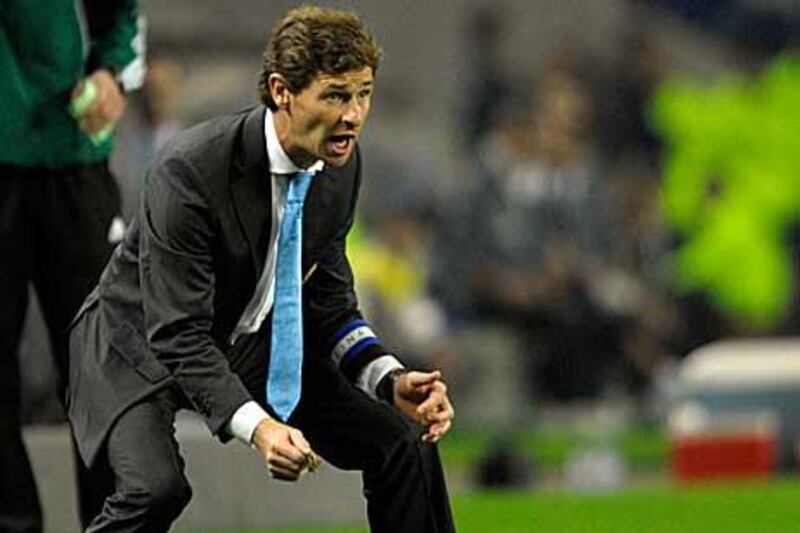"I am not a clone of Jose Mourinho," Andre Villas-Boas finds himself obliged to insist.
The head coach of Porto, who seek to extend their unbeaten record for the season against CSKA Sofia in the Europa League tonight, probably has several years ahead of making similar statements, of having to carry the label "Mini-Mourinho".
But there is also little doubt that the one-time apprentice of the current head coach of Real Madrid is doing plenty to assert himself as his own man.
Last weekend, Villas-Boas's Porto, who lead the Portuguese top-flight by eight points, set a new domestic milestone of 34 competitive matches without defeat.
Villas-Boas, who is 33, has not overseen all those matches, the first 10 fell at the end of the previous season when Porto still employed Jesualdo Ferreia as coach.
But he wears the badge of honour with a certain pride, not least because the previous record, 33 matches in a row without losing, belonged to Porto, too.
That was when they were under Mourinho's control, triumphing in domestic competitions and winning the Uefa Cup and the Champions League.
Villas-Boas was a junior Porto employee at that stage, as assistant to Mourinho, whom he first encountered as a teenager.
He had volunteered to help out the late Bobby Robson when he was in charge of Porto in the late 1990s; Mourinho worked for Robson.
Villas-Boas's bumptious approach and appetite for hard work impressed them both. It would later convince Mourinho that here was a bright, industrious, confident individual who could be useful to his coaching staff. He followed Mourinho to Chelsea in 2004, and then to Inter Milan in 2008.
Comparisons started being made between Mourinho, who is 14 years Villas-Boas's senior, and his sidekick when the younger man attracted headlines, like for his involvement in various verbal altercations after a stormy Champions League tie between Chelsea and Barcelona in 2005.
But it is the rigour of his approach, and his background in football, that most identifies Villas-Boas with his old boss.
Like Mourinho, Villas-Boas was never much of a footballer, unlikely to pursue a long or successful professional career, so he decided early to learn the coaching side of the game.
As Mourinho had been to Robson, he proved a shrewd observer of opponents for Mourinho, and an enthusiastic interpreter of tactics, a good linguist.
His resume contains one or two eccentricities. Villas-Boas, then in his early 20s, was briefly appointed the head coach of the British Virgin Islands national team.
Soon afterwards he became one of Mourinho's loyalists and it was with some reluctance that Mourinho waved goodbye to him at Inter in October 2009, after a professional relationship that had lasted seven years, when Villas-Boas was offered the role of head coach at Academica de Coimbra in his native Portugal.
Academica were struggling. By the season's end he had lifted them to 11th in the table, well clear of the threat of relegation.
Like Mourinho, who enjoyed success with Uniao de Leira in Portugal before joining Porto, Villas-Boas had earned his spurs with a small club in a league dominated by the bigger hitters, Benfica, Sporting and Porto.
There followed a vivid tug-of-war between Porto and Sporting for the promising young coach. He went to the club he knew best of the two.
Having finished only third under Ferreira last season, Porto were not in the Champions League; in the Europa League, they have breezed into the knockout phase, winning four of their five group games. Last month, in the league, they walloped Benfica 5-0.
As ever, the club had sold important players - for a handsome profit - in the summer, notably Bruno Alves, to Zenit St Petersburg and Raul Meireles to Liverpool.
But Villas-Boas has harnessed the attacking strength of the Brazilian Hulk and the Colombian Radamel Falcao effectively and made their defence among Europe's meanest. Witness a domestic goal difference of plus 24 from 13 fixtures.
With Porto, he would anticipate a turnover of playing staff come the summer, which may affect his future plans. Or indeed, it may be that Villas-Boas finds himself the chief target of wealthier clubs.
Inter, poised to reassess the position of Rafa Benitez should they not win the Club World Cup in Abu Dhabi, have been linked, as they become increasingly nostalgic for the successes enjoyed by Mourinho, who may not have cloned Villas-Boas, but will always be considered his mentor.






